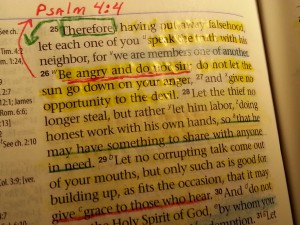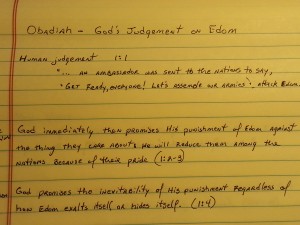The Angry Christian
Be angry and do not sin; do not let the sun go down on your anger,
and give no opportunity to the devil.
Ephesians 4:26 – 27 ESV

Fighting in Anger
Our church is studying what it means to be members of the church. Recent lessons are on unity within the church and building one another up. As I read the passage above I was struck by Paul’s command five verses later:
Let all bitterness and wrath and anger and clamor and slander be put away from you, along with all malice.
Ephesians 4:31 ESV
It stuck in my craw at this point: is Paul telling me that I should “Be angry” and then telling me to put away “… all … anger ….” five verses later? That just seems a little psychotic. Thus I started digging in.

Ephesians 4:26 highlighted in my NASB
When I’m studying something I like to read different translations and different commentaries on passages. I like to highlight passages based on things that are commands, promises or pertain to deeper theology and sometimes I make outlines (like I did for the book of Obadiah in the photo below).
My first step was to see if the context clarified my confusion. It didn’t. To the contrary, the text appeared to say one thing and then appeared to say something different very soon thereafter that led to my confusion.
I decided to look at the verbs and see what they are. The verbs are “be angry” (òργíζεσθε) and “do not sin” (αμαρανετε); the first is in a Middle or Passive voice while the command to not sin is in the Active. This does not advocate for being angry.
It was at this point that I went back to the notes and commentaries to try gaining a broader viewpoint into the passage and I found this nugget in the MacArthur study Bible notes:
“Quoted from Ps 4:4 ….”
Say What?!? I don’t know how I’d never caught that before but hey, if there’s a passage that directly defines the context from which Paul took the verse let me at it. I want to know what it was that Paul was thinking when he quoted Jewish Scripture to Greek Christians at Ephesus.
Be angry, and do not sin; ponder in your own hearts on your beds, and be silent. Selah
Psalm 4:4 ESV
Wow! Awesome. Now I can see how David used this concept to gain a better understanding of what Paul was thinking and why this song from David came to Paul’s mind when he was in the middle of talking about Christians being joined in unity, caring for and uplifting one another as we speak into each other’s lives. Next I read David’s whole song and found that he had a method for dealing with his anger when he felt oppressed.
To the choirmaster: with stringed instruments. A Psalm of David.
1 Answer me when I call, O God of my righteousness! You have given me relief when I was in distress. Be gracious to me and hear my prayer!
2 O men, how long shall my honor be turned into shame? How long will you love vain words and seek after lies? Selah
3 But know that the LORD has set apart the godly for himself; the LORD hears when I call to him.
4 Be angry, and do not sin; ponder in your own hearts on your beds, and be silent. Selah
5 Offer right sacrifices, and put your trust in the LORD.
6 There are many who say, “Who will show us some good? Lift up the light of your face upon us, O LORD!”
7 You have put more joy in my heart than they have when their grain and wine abound.
8 In peace I will both lie down and sleep; for you alone, O LORD, make me dwell in safety.
Psalm 4:1-8
- Call out to God for His support/relief
- Don’t get sidetracked & focus on what’s ticking you off
- Declare truths about God & His goodness to you
- Consider what you’re angry about in solitude before God
- Continue to perform as God requires of you
- Don’t overlook God’s goodness as some do
- Instead remember what He’s done for you to put joy into your heart
- Rest in the Lord knowing how He’s delivered you & how He will continue.
So David demonstrates in song that he, the slayer of lion, bear and giant, sometimes got so mad that he had to get away from folks, lay on his bed and ponder/consider/meditate (take a look at David’s method to approaching his anger in the sidebar). David is reminding people through this verse that when they are angry they shouldn’t sin but get alone, meditate and remember how God’s blessed them (see how he contrasts people in vv 6 & 7). I think I have more insight into Paul’s thoughts to the Christians at Ephesus and why Paul’s commands include verse 26 and 31 in the same passage.
Paul’s command in Ephesians 4:26 isn’t intended to exhort Christians to be angry but that when they are angry they should not sin. That makes much more sense. Paul’s not calling for righteous indignation here; he’s acknowledging the fact that all people get angry and his exhortation is that when we do, we must not sin. This also fits with the following directive that we are not to let the sun go down on our anger but quickly deal with it lest we give the devil an opportunity. Five verses later Paul gives very clear instruction that Christians are to “… put away … all … anger ….”
One implication is that anger is not a sin in itself.
Paul acknowledges (not advocating for) the fact that we will, in our frailty & humanity, be angry. His command is that while we are angry we should not sin.
This makes more sense. Paul’s admonition alludes to what David shared about dealing with anger. Be honest about it with the Lord but learn to use David’s process to move past it quickly in order to not give Satan a foothold to try and turn our hearts from sinless and possibly vindicated anger to sin through bitterness, wrath, clamor, anger and slander. We cannot help being angry but we are empowered by the Holy Spirit and called by a holy God to not sin in our anger.
